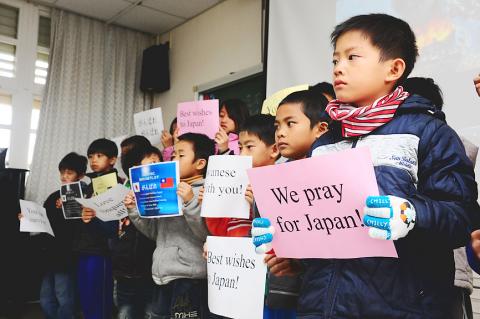Government officials yesterday admitted Taiwan was not fully prepared to deal with a natural catastrophe of the magnitude that hit Japan last Friday, killing thousands and sparking a series of malfunctions at a nuclear power station.
Amid concerns over the ability of authorities to respond to a similar situation, lawmakers across party lines asked the Ministry of the Interior and representatives from the Atomic Energy Council (AEC) and Taiwan Power Co to share their views on their preparedness at the legislature’s Internal Administration Committee.
However, the presentation by Minister of the Interior Jiang Yi-huah (江宜樺) raised more questions than it answered.

Photo: Tsai Tsung-hsien, Taipei Times
“Based on Japan’s evacuation plan, if nuclear emergencies occurred at the No. 1 and No. 2 nuclear power plants, we would have to evacuate residents in the Greater Taipei metropolitan area,” Democratic Progressive Party (DPP) Legislator Yeh Yi-jin (葉宜津) said, referring to the Jinshan Nuclear Power Plant in Shihmen District (石門), New Taipei City (新北市), and the Guosheng Nuclear Power Plant in Wanli (萬里), also in New Taipei City.
“Do we have any concrete evacuation plan in the event of an emergency?” Yeh asked. Those concerns were echoed by DPP Legislator Tien Chiu-chin (田秋堇) and Chinese Nationalist Party (KMT) Legislator Chi Kuo-tung (紀國棟).
Jiang said no such plan exists.
“In the event of such a nuclear emergency, we would make a step-by-step evacuation,” Jiang said. “However, for the moment, we don’t have an evacuation plan for the Greater Taipei metropolitan area, which includes Taipei, New Taipei City and Keelung.”
Chi asked how the government would deal with a worst case scenario, such as a massive earthquake triggering a nuclear crisis and damaging the 37 bridges connecting Taipei to New Taipei City, thus blocking major traffic gateways out of Taipei.
Again, the answer was that the government did not presently have a strategy for dealing with such a situation.
Yeh asked whether the ministry had standardized procedures for dealing with an earthquake-triggered nuclear crisis.
Under the law, the ministry would be in charge of dealing with the aftermath of an earthquake, while the AEC would be responsible for handling a nuclear crisis.
Jiang said both agencies had yet to discuss how such coordination would work, but he promised to discuss the matter with the council as soon as possible.
“The law stipulates that the AEC should set up an emergency operations center if an emergency occurs at a nuclear power plant, while a central emergency operation center would deal with earthquakes, typhoons or tsunamis,” Jiang said. “However, as to what would happen if a nuclear crisis were triggered by an earthquake or tsunami … the law is not very clear.”

FALSE DOCUMENTS? Actor William Liao said he was ‘voluntarily cooperating’ with police after a suspect was accused of helping to produce false medical certificates Police yesterday questioned at least six entertainers amid allegations of evasion of compulsory military service, with Lee Chuan (李銓), a member of boy band Choc7 (超克7), and actor Daniel Chen (陳大天) among those summoned. The New Taipei City District Prosecutors’ Office in January launched an investigation into a group that was allegedly helping men dodge compulsory military service using falsified medical documents. Actor Darren Wang (王大陸) has been accused of being one of the group’s clients. As the investigation expanded, investigators at New Taipei City’s Yonghe Precinct said that other entertainers commissioned the group to obtain false documents. The main suspect, a man surnamed

DEMOGRAPHICS: Robotics is the most promising answer to looming labor woes, the long-term care system and national contingency response, an official said Taiwan is to launch a five-year plan to boost the robotics industry in a bid to address labor shortages stemming from a declining and aging population, the Executive Yuan said yesterday. The government approved the initiative, dubbed the Smart Robotics Industry Promotion Plan, via executive order, senior officials told a post-Cabinet meeting news conference in Taipei. Taiwan’s population decline would strain the economy and the nation’s ability to care for vulnerable and elderly people, said Peter Hong (洪樂文), who heads the National Science and Technology Council’s (NSTC) Department of Engineering and Technologies. Projections show that the proportion of Taiwanese 65 or older would

Democracies must remain united in the face of a shifting geopolitical landscape, former president Tsai Ing-wen (蔡英文) told the Copenhagen Democracy Summit on Tuesday, while emphasizing the importance of Taiwan’s security to the world. “Taiwan’s security is essential to regional stability and to defending democratic values amid mounting authoritarianism,” Tsai said at the annual forum in the Danish capital. Noting a “new geopolitical landscape” in which global trade and security face “uncertainty and unpredictability,” Tsai said that democracies must remain united and be more committed to building up resilience together in the face of challenges. Resilience “allows us to absorb shocks, adapt under

Taiwan Semiconductor Manufacturing Co (TSMC, 台積電) yesterday said it is building nine new advanced wafer manufacturing and packaging factories this year, accelerating its expansion amid strong demand for high-performance computing (HPC) and artificial intelligence (AI) applications. The chipmaker built on average five factories per year from 2021 to last year and three from 2017 to 2020, TSMC vice president of advanced technology and mask engineering T.S. Chang (張宗生) said at the company’s annual technology symposium in Hsinchu City. “We are quickening our pace even faster in 2025. We plan to build nine new factories, including eight wafer fabrication plants and one advanced